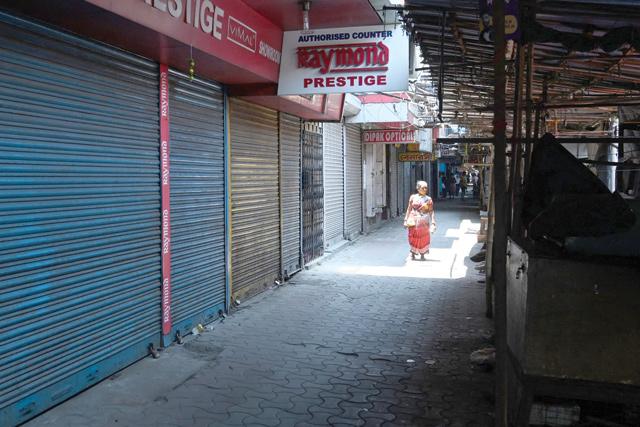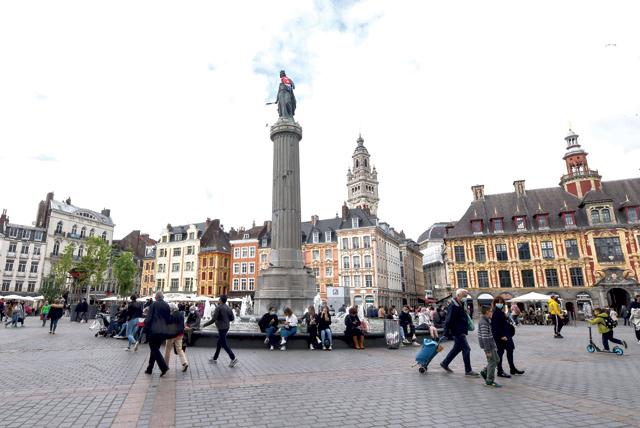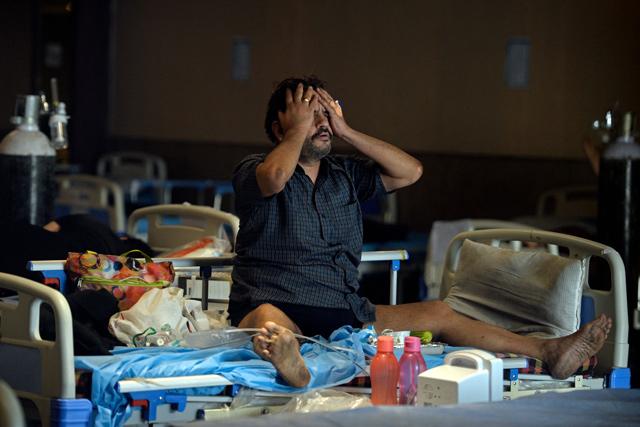You are here
Britain eases lockdown as Asia outbreaks fuel concern
By AFP - May 18,2021 - Last updated at May 18,2021

A woman walks past a closed market after West Bengal government announced a 15-day lockdown to curb the spread of the COVID-19 coronavirus in Kolkata on Monday (AFP photo)
LONDON — Britons hugged their loved ones and streamed into pubs, gyms and other indoor venues on Monday as the country eased pandemic restrictions, but Asia faced more misery with new variants and a cyclone disrupting the fight against a COVID-19 wave ravaging India.
As the United States and Britain move away from harsh restrictions thanks to rapid immunisation campaigns, new strains have forced several countries in Asia to shut schools and impose travel bans, highlighting the persistent global threat posed by the pandemic.
With known global infections approaching 163 million and the rise of new variants complicating the fight, governments are desperately ramping up vaccine campaigns, with Germany the latest country to make jabs available to all adults from next month.
Elsewhere, governments pushed ahead with easing restrictions, a moving breakthrough for some.
"I actually feel a wee bit emotional saying this... you can hug your loved ones again," Scotland's First Minister Nicola Sturgeon said as businesses reopened in what The Sun tabloid dubbed "Freedom Monday".
'Nice to be back'
Across England, Wales and most of Scotland, people on Monday could once again grab a drink, a bite and dine inside pubs, restaurants and cafes.
Cinemas, museums and sports venues also opened their doors for the first time in months.
"What's nice is to see people we don't know. Seeing people happy, you can see people smiling and enjoying themselves," said Yara Mahran, 24, shortly before heading into a London cinema.
People were able to once again visit each other at home — and to head to Portugal, where the British are normally the largest tourist contingent.
"It's nice to get away and be back here," said Barry Thompson, a 63-year-old retired policeman from Manchester who landed in the southern town of Faro with his wife and son.
"We're very excited."
In another sign of life returning to normal in Europe, Disneyland Paris announced it would reopen on June 17.
But authorities have urged caution and warned that with new variants spreading, restrictions could be reintroduced.
‘Wake-up call’
The pandemic has claimed more than 3.3 million lives worldwide, and one of the worst outbreaks is in India, where at least 4,000 people are dying from COVID-19 every day.
India was already dealing with limited medical infrastructure and scarce vaccine supplies, when a major cyclone in the Arabian Sea packing ferocious winds bore down on the South Asian nation.
Gujarat state moved all COVID-19 patients from hospitals within 5 kilometres off the coast where the storm is expected to hit.
Authorities there were also scrambling to ensure there would be no power cuts at designated COVID-19 hospitals and oxygen plants in the districts under threat from the storm.
Nearly 600 patients in Mumbai, India’s financial capital, were also moved to “safer locations”.
The variant behind the explosive outbreak in India has spread to at least 44 countries, according to the World Health Organisation.
They include Singapore, where a growing number of cases has prompted the government to tighten restrictions, including closing schools.
“A lot of people have taken for granted the past few months of peace and stability, but this is a wake-up call,” said Anthony Chang, a stall owner in the city-state.
The authorities in Taiwan, which emerged relatively unscathed from the pandemic last year, announced a suspension of classes in schools from Tuesday in Taipei and adjacent New Taipei City as the island battled a surge in infections. The island also banned all foreigners, except residents, from entry or transit for a month.
In some hard-hit countries, vaccine drives offered a glimmer of hope for the future.
In South Africa, the continent’s worst-hit country on the cusp of a third wave, authorities launched a large-scale campaign aiming to immunise five million people over the age of 60 by the end of June.
And Europe’s largest economy Germany said it would make vaccines available to all adults in three weeks.
“We have agreed to lift the priority system on June 7,” Health Minister Jens Spahn said Monday.
The persistent threat of the coronavirus is casting a shadow on the already delayed Tokyo Olympics, due to begin in less than 10 weeks even with parts of Japan under a state of emergency.
Organisers have insisted that they will go ahead despite the risk, but the opposition was brought into focus Monday when a new poll showed 80 per cent of Japanese were against hosting the Games this year.
Related Articles
PARIS — The French returned to their beloved cafe terraces Wednesday, while the EU said it would open its borders to vaccinated travellers a
LONDON — Schools and stores reopened in several parts of Europe on Monday as the continent eased out of months of COVID-19 lockdowns, but In
LONDON -- British authorities warned against large gatherings ahead of the Euro 2020 football final Sunday, fearful of the highly transmissi



















